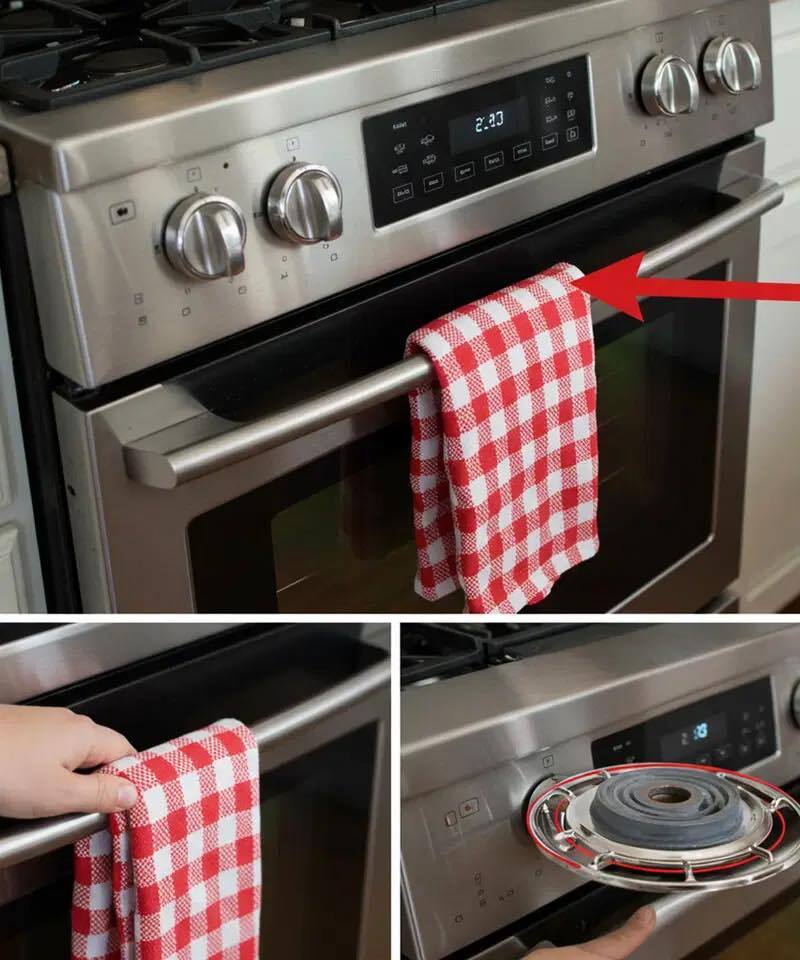In every kitchen, dish towels are among the most used tools, helping with everything from drying clean dishes to wiping countertops and keeping hands dry while preparing food. They’re a kitchen essential, and most people keep them nearby for quick access. But there’s one habit many people share that seems harmless on the surface yet poses serious risks: hanging dish towels on the oven door.

While it might seem convenient—especially if you’re hoping the heat from the oven will dry the towel faster—this seemingly minor decision can actually compromise both your kitchen’s hygiene and your home’s safety. Many assume that placing a towel near heat helps it dry quickly, but this convenience can come at a cost. The primary role of a kitchen towel is to support cleanliness, whether that’s drying washed dishes, cleaning glassware, or wiping spills from kitchen surfaces. It plays a crucial role in preventing cross-contamination, especially during food preparation, and helps reduce the spread of bacteria and the risk of foodborne illnesses. But what many don’t realize is that the oven door, despite being in a place we associate with heat and cooking, is actually a common hotspot for germs. Think about how often you touch the oven handle—whether with hands dusted in flour, slicked with oil, or after handling raw meat.
Most people don’t stop to wash their hands before opening the oven, which means that oven handles often harbor bacteria and grime. When you drape a dish towel over the handle, you’re essentially exposing it to those same germs. Later, when you use the same towel to dry clean dishes or wipe your hands, you’re unknowingly spreading those germs to other areas, defeating the purpose of having a towel meant for cleanliness. Beyond hygiene concerns, hanging towels on oven doors presents a potential fire hazard. While ovens are designed to handle high heat inside, the external parts, especially when the oven is turned on or still hot from recent use, can cause damage to cloth materials. There’s a real risk of a towel catching fire or at the very least deteriorating from heat exposure.
Even if the towel doesn’t ignite, prolonged exposure to heat can wear down the fabric, make it smell musty, or reduce its absorbency over time. Instead of hanging towels on oven doors, consider placing them on designated towel hooks, cabinet handles that are not near heat, or over a towel rack. This not only keeps your towel cleaner but also reduces the risk of an accidental fire or spreading bacteria. Proper towel care is just as important as placement. A lot of people think giving a towel a rinse or tossing it in with the laundry on a regular cycle is enough, but that won’t fully eliminate bacteria.
Kitchen towels are exposed to a high level of bacteria due to their frequent use, so they need a more thorough cleaning routine. The best way to ensure your kitchen towels are truly clean and safe to use is by washing them in the washing machine on a hot cycle—ideally at 90°C (194°F). This high temperature helps kill bacteria that normal warm or cold water might leave behind. To further boost cleaning power, consider adding baking soda to the wash drum. Baking soda not only helps remove tough stains but also neutralizes odors and leaves towels smelling fresh. It’s a simple trick that makes a big difference. In short, your dish towels are one of your first lines of defense against kitchen messes and cross-contamination, but only if you treat them with the same attention you give to your food prep. Something as small as where you hang them can influence how clean and safe your kitchen truly is. So next time you’re tempted to toss your towel over the oven handle, remember what’s at stake. Cleanliness, food safety, and even fire prevention can all come down to the little choices we make. Take a moment to store and clean your towels properly—they’re small habits that lead to a healthier, safer kitchen for everyone.





